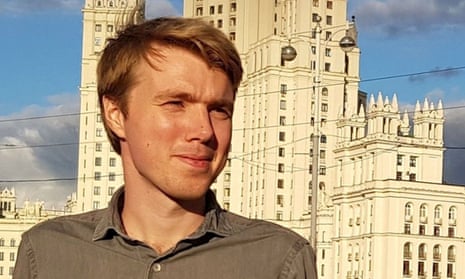Russia has expelled a Dutch reporter, his newspaper has said, as Moscow continues its crackdown on domestic and foreign journalists in the country.
De Volkskrant journalist Tom Vennink said his visa was revoked and he was given three days to leave the country after difficulties renewing his journalist accreditation.
The expulsion is the second of a foreign journalist in recent months, following Russia’s decision in August to ban the BBC reporter Sarah Rainsford from the country as a “security threat”.
Formally, Vennink was targeted by Russia’s interior ministry for two minor administrative violations, including a failure to register his temporary address, dating back to 2019. But an increasingly bitter relationship between Moscow and Amsterdam appears to have played a role in the decision.
Vennink, a respected foreign correspondent who has reported from Russia since 2015, said the expulsion came as a surprise.
“Russian journalists face serious obstacles in their work, but as a foreign correspondent I was able to report relatively freely on Russia and the Russians for the past six years,” he said. He is now back in the Netherlands.
In an article published by de Volkskrant, the editor-in-chief, Pieter Klok, called the timing of the expulsion a “mystery”. The forced departure of the journalist was unprecedented for the newspaper, which has had a correspondent in Moscow since 1988.
In an interview, Klok described Russia’s decision-making process as opaque. “That’s also the problem to do something about it,” he said. “Because you don’t know where to start.”
Klok said that there was a growing concern in the days leading up to Vennink’s expulsion as his accreditation had been renewed only for a short period.
That coincided with a period of heightened tensions between Moscow and The Hague that has put Dutch journalists in Russia on edge. “The feeling is among all Dutch correspondents that there is a danger that they can be expelled from the country,” said Klok.
Court hearings are ongoing at The Hague over the 2014 shooting down of the MH17 passenger jet over Ukraine that left nearly 200 Dutch citizens dead. European governments have said the missile that shot down the plane came from Russia, although Moscow denies this.
Russia also protested against a recent Dutch appeal court decision not to give it control of a trove of Scythian gold that was on loan from Crimean museums when Russia annexed the peninsula in 2014. The Dutch supreme court is set on Friday to decide on a $50bn arbitration award that Russia has been ordered to pay to former shareholders of the defunct oil producer Yukos.
Klok said it was possible that the court cases had played a role in the decision but added: “It’s all speculation and we just don’t know.”
The outgoing Dutch foreign minister, Ben Knapen, told de Volkskrant: “It is not acceptable for the Netherlands if a journalist has to leave a country against his will.”
Russia has cracked down on press freedoms in the last year, targeting dozens of local journalists as “foreign agents” and “undesirable organisations” after a series of high-profile leaks about prominent allies of Vladimir Putin and Russia’s intelligence services.
But foreign journalists were rarely targeted for expulsion until Rainsford was told her visa would not be extended. Moscow said the reason was a UK refusal in 2019 to accredit a reporter from the Russian state news agency Tass. Yet Rainsford said she was told by border guards she would not be allowed back into Russia because she was classified as a national security threat. She left the country at the end of August.
Luke Harding, a former Moscow correspondent for the Guardian, was expelled in 2011. He was denied entry at the border and told by an airport security official working for the federal border service: “For you Russia is closed.” Russia barred the US journalist David Satter in 2014, and a Polish correspondent for the Gazeta Wyborcza daily was ordered to leave in 2015.
